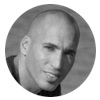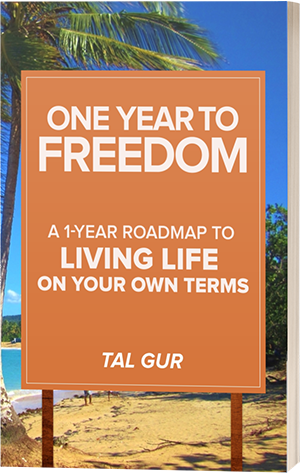Have you ever dreamt of the freedom to work anytime, anywhere you want?
As you probably know, connecting with people who share the same dream goes a long way in getting you there.
It was this exact sentiment that inspired Dan Andrews to embark on the daring adventure leading to Tropical MBA. What began as a podcast on a shoestring budget has grown into a global community of lifestyle entrepreneurs
Dan started Tropical MBA with no security savings and with none of the credentials of formal training; he and his business partner simply lunged after the dream of helping people like them achieve the lifestyle of location independence.
In this interview I explore with Dan how he came to start Tropical MBA and why “lifestyle businesses” can be such a lucrative investments.
Enjoy!
1. Hey Dan, what kind of work were you doing when you first got the idea and inspiration to pursue “lifestyle business”?
I was working for a small manufacturing company in California, the owner of which would become my first business mentor. At the time my commute was over 2 hours a day, I was working really long hours, and his small company was growing very fast. It was really a trial by fire.
I’m thankful for that experience and all it taught me, and while I was in that situation I felt thankful as well. It was a really great job. After a few years of exhausting work, however, I started to slowly realize that I could work like I was for the next 10 or 15 years and never achieve the specific types of freedom– namely time and location– that I really was seeking.
I think at the time I thought getting “rich” would solve for those desires, but the day I sat down and really thought it through with the numbers was probably the day I took on the entrepreneurial mindset.
2. What were your personal motivations for seeking the freedom of location independence? In what ways have your goals evolved?
 A fundamental desire to explore the world at my own pace, and probably most importantly, the desire to own my own time. Right now it’s a Tuesday afternoon and I’m relaxing in a cafe in a beautiful town, on an island that is exciting and exotic to me, spending quality time with good friends who are building similar lifestyles.
A fundamental desire to explore the world at my own pace, and probably most importantly, the desire to own my own time. Right now it’s a Tuesday afternoon and I’m relaxing in a cafe in a beautiful town, on an island that is exciting and exotic to me, spending quality time with good friends who are building similar lifestyles.
Only a few years ago I felt that I had no such opportunity, and that my time and location would be dictated by companies or bosses largely out of my control. There isn’t a day that goes by that I don’t appreciate the opportunity I have to control how I spend my time and where I spend it. I guess my goals haven’t evolved very much, the attacks on that freedom can just come from different angles as your business evolves.
3. How much did you know about business when you started? How did you build the necessary skills on your own? What could you have only learned by just diving in?
When I started my own business I had a good background in enterprise building building. I wasn’t shy to jump into any business and try and help it achieve it’s goals. I want to distinguish that from “knowing about business.” Having confidence, care, and a ‘kick ass’ mentality is more important than understanding the nuance of a P&L in most small businesses.
4. Would you say that this kind of experiential learning takes a certain change in mindset to be successful?
I guess it depends what mindset you are starting out from. I never really admired what I saw as “business people” growing up, but I was never scared to throw a party, start a band, convince others to go on a trip, to start a new initiative, or to ask people to consider a new perspective.
Looking back on it, those things are much closer to entrepreneurship than whatever I assumed “business.” One way to look at cutting deals is as convincing others that a perspective you have is worth considering seriously. That’s always been something I’ve had in me. I never wanted to be in any enterprise where I wasn’t able to be at the decision maker’s table.
If you don’t want to be at that table, it’s a good place to start a personal inventory, because it seems like an almost-critical element to growing successful businesses.
5. Have you experienced any difficulties because you lack business school credentials? How does not having an MBA sometimes work to your advantage?
Not that I know of, very few of my peers and colleagues have business credentials, but that could just be the self-selecting crowd I run in. At the time I was selecting degree programs, I couldn’t think of anything more boring that business to be honest, but I suppose that’s before the media sexified start-up culture, perhaps my mindset would be different nowadays.
Not having an MBA has saved me a bunch of money and time, outside of that I don’t know how it would have benefited me to have one!
6. Why do you think that the podcast was the most appropriate format for you and your partner to start your business? What made it so successful?
 The podcast was actually just something we started for fun. We loved radio and we loved business, so we thought we’d combine both. Still 95% of our sales revenue has nothing to do with our podcast, although we have build a significant business off the back of the podcast as well.
The podcast was actually just something we started for fun. We loved radio and we loved business, so we thought we’d combine both. Still 95% of our sales revenue has nothing to do with our podcast, although we have build a significant business off the back of the podcast as well.
It wasn’t the most strategic decision at the beginning. Our first episodes suck. But we knew it was something we were willing to stick with for 5 years. We wanted to connect, we wanted to learn to express ourselves and to speak well, and we loved radio and podcasts. So in that sense the decision made itself. There was no downside for us.
7. Are you always location independent, or are there times when you profit — in business and in life — from being located?
Everything in life is a trade-off. The key distinction seems to be are you “stuck” in a location or “invested” in a location. The former would never be attractive in my view.
8. In your experience, how does a person know that location independence is right for them? Are there any sure signs?
Ok let me get radical here– there seems to me very few circumstances where location independence wouldn’t be considered an immense privilege and luxury. How much you exercise that privilege, and whether you have the resources and wherewithal to achieve it are up to the tastes of individuals. I suppose the only way to know is to give it a try.
9. What are the first steps toward making the lifestyle change you promote?
The first step is with your personal finances. That’s the ground zero of entrepreneurship. 9 times out of 10 it’s our finances that keep us stuck to jobs that keep us stuck to locations. I’d recommend people checking out thinkers like Dave Ramsey and focusing on getting their finances in order and paying down all debts.
10. What are some of the products or startups in the Tropical MBA network that you are most excited about? Why?
Besides checking out a list of blogs and podcasts that I listen to, also I’ve got an in-depth reading list at this page. Right now I’m most excited about productized services (there are many examples in this episode). The reason is I think that they are some of the easiest (and that doesn’t mean it’s easy!) ways to get into the location independent lifestyle. Many services are needed by the rapid growth in the internet business space, and it’s possible for people with minimal experience to get involved quickly and to have a lot of precedent cases and peers to work with and follow.
Thank you Dan
—
Dan Andrews is a world traveler, lifestyle entrepreneur, and the founder of Tropical MBA, a blog and podcast location independent enthusiasts. You can also find him on Twitter @TropicalMBA
Author
 Tal Gur is a world traveler and personal development enthusiast. An adventurer at heart, after trading his daily grind for a life of his own daring design, Tal spent a decade pursuing 100 major life goals around the globe. His journey continues as a location-independent blogger, lifestyle entrepreneur, and coach. Tal’s published two books: One Year to Freedom, a 1-Year Roadmap to Living Life on Your Own Terms; and, his most recent book and bestseller, The Art of Fully Living – 1 Man, 10 Years, 100 Life Goals Around the World.
Tal Gur is a world traveler and personal development enthusiast. An adventurer at heart, after trading his daily grind for a life of his own daring design, Tal spent a decade pursuing 100 major life goals around the globe. His journey continues as a location-independent blogger, lifestyle entrepreneur, and coach. Tal’s published two books: One Year to Freedom, a 1-Year Roadmap to Living Life on Your Own Terms; and, his most recent book and bestseller, The Art of Fully Living – 1 Man, 10 Years, 100 Life Goals Around the World.




